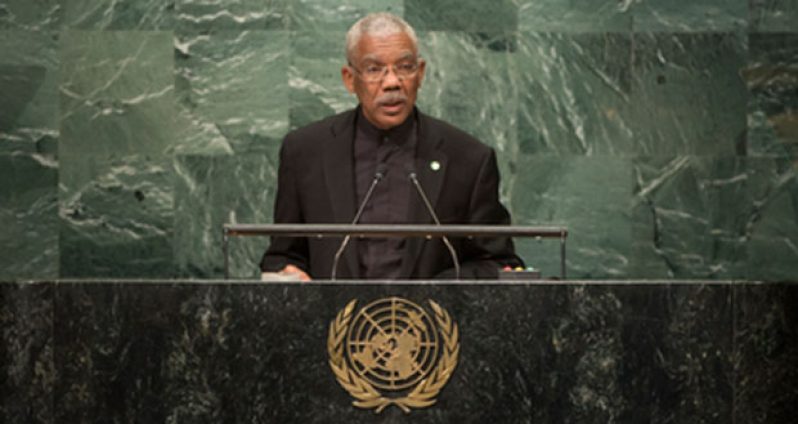-President Granger urges UN to bring quick end to border controversy
By Ariana Gordon in New York
PRESIDENT David Granger has called on United Nations Secretary General Ban Ki-moon to “free” Guyana from the territorial sovereignty challenge posed by neighbouring Venezuela.During his address at the opening of debates at the 71st Session of the United Nations (UN) General Assembly in New York on Tuesday, President Granger said Guyana’s climate change and economic efforts are being severely hampered by Venezuela’s threats to its territorial sovereignty.
Last year, months after he took office, President Granger attended the UN Summit and called on the international community to support Guyana in its ongoing controversy with neighbouring Venezuela over territorial space. Venezuela has claimed a significant part of Guyana as part of its territory, and the Guyanese leader has said the threat posed by the Spanish-speaking country is preventing Guyana from fully exploiting its rich natural resources.
Guyana’s territorial integrity has, for 50 years, been violated by Venezuela, and Venezuela has issued a number of decrees claiming territory in Guyana. The UN Secretary General is expected to demit office in December, and President Granger has expressed much optimism that his country’s request for a juridical settlement of the border controversy would materialise. Guyana has maintained that the juridical route is the only solution to the ongoing border controversy with Venezuela. Venezuela, on the other hand, has called for a restart of the Good Officer process.
President Granger said on Tuesday that Guyana’s advances in the area of climate change would be of no use if Venezuela remains a threat to Guyana’s territorial integrity. “Guyana is part of this global ‘green’ movement: its natural assets, commitment to sustainable development, contribution to countering the adverse effects of climate change, and collaboration with the international community in seeking solutions to global threats have distinguished it as an emergent ‘green’ State.”
But notwithstanding this progress, the country is constrained, and according to President Granger, all of the country’s efforts — whether nationally, regionally or globally -– aimed at advancement in a peaceful and stable environment are being challenged by the “territorial ambitions” of Venezuela.
“I place hope in the fact that the process for a final resolution of Venezuela’s unworthy territorial claims rests now in the hands of the Secretary General of the United Nations,” he said.
He also said that Venezuela has, for a full year since he last spoke at the UN, stalled Guyana’s progress by every means at its disposal, and has intensified its aggression against Guyana and thwarted all of the Secretary General’s efforts to pursue ‘a way forward’ – at least in terms of a process that promises final resolution to the controversy.
The President noted that Guyana stands ready to have the International Court of Justice (ICJ) bring finality to the matter. Guyana, he said, will continue to work resolutely with Secretary General Ban Ki-moon during his final months in office; and thereafter with his successor, to “free Guyana from this surreal burden.”
Venezuela agreed, in the Geneva Agreement of 1966, to have the United Nations’ Secretary General determine the means of settlement of this matter, including by judicial settlement, the President reminded; and noted that despite its agreement, Venezuela “defies (the Secretary General’s) every effort to fulfil that commitment.”
The Guyanese leader said the UN cannot be a “dispassionate party to a threat to peace anywhere, and a challenge to the law of nations.” Venezuela’s territorial claim, he said, is a challenge which strikes “at the heart of the United Nations, its trusteeship of the law of nations, and the Charter which the Secretary General upholds.”
Guyana, President Granger added, looks to the UN for protection against threats to its security, and for intervention to ensure peace and respect for international law.
Said he: “Mr. President, my plea for international understanding of our plight has nothing to do with Venezuela’s internal situation. The ordinary people of Venezuela are our sisters and brothers; their agonies touch our hearts, and we wish them early relief from their ordeal.
Venezuela’s claims, however, are a threat to our existence as an independent nation. They are a scandalous revival of the conquistadoral disease that once plagued its own history; they are a crime against our humanity clothed in the verbiage of national honour.”
Within the context of the preservation of sovereignty and its inextricable link to sustainable development, the President reiterated Guyana’s continued support for the complete removal of the commercial, economic, and financial blockage imposed by the United States against Cuba, another Caribbean country.
“We cannot commit to policies to transform our economies, to provide development for our peoples, and not demonstrate the political will to change systems that are in direct contradiction to those policies,” President Granger said.












